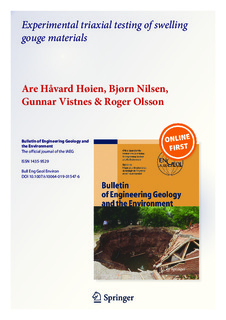| dc.description.abstract | Adequate rock support in weakness zones that may contain swelling minerals poses one of the main challenges of excavating tunnels in hard rock conditions. Deformations under such conditions are influenced by several factors, including the properties of the rock mass, rock stress and the possible swelling potential of the minerals. Thus, dimensioning rock support may be challenging. To increase the knowledge regarding the processes behind deformations in areas of swelling gouge material, an experimental triaxial laboratory test of such material was performed. The main objective was to investigate whether the material might exert pressure under typical in situ stress conditions, or whether other processes might be dominant. In addition, the possible elastic and strength properties of such material were investigated. The testing was performed on reconstituted cores with material from four different locations in eastern Norway. The material was dried and then pressed into cores using a compactor. The triaxial testing consisted of four successive phases: pre-stressing 1; water addition under constant strain; pre-stressing 2 and failure. The results indicate that factors other than swelling pressure are the main causes of tunnel deformation, as no build-up of swelling pressure was observed during the water addition phase. Initially, the E-modulus and strength properties of the samples were very low, which can cause large, immediate deformations in situ. In addition, creep and possibly a reduction in the Emodulus during water addition seemed to cause time-dependent deformation. | |
